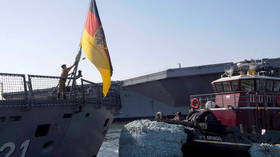US wants Germany for Gulf mission, but it's choice between 'war room' & 'negotiating table'

Germany is currently considering a joint maritime operation with the US and UK in the Persian Gulf. Even at the risk of angering Washington by refusing, Berlin has no appetite for conflict with Iran, analysts told RT.
The US has formally asked Germany to join a mission aimed at "protecting" maritime traffic through the Strait of Hormuz, along with Britain and France, the US Embassy in Berlin said on Tuesday. Building up a 'coalition of the willing', Washington and London aim to combat so-called "Iranian aggression" as they slam Tehran's seizure of the British-flagged Stena Impero oil tanker.
Earlier, an Iranian supertanker was captured by the British Royal Marines in Gibraltar. It was accused of transporting crude to Syria in violation of EU sanctions, although Tehran refuted the allegations and likened the case to piracy.
Also on rt.com ‘Don’t walk into Trump’s & his poodle Johnson’s trap’: German govt split over sending navy to GulfThough the proposed operation has the support of some politicians and shipping industry figures in Germany, Chancellor Angela Merkel will likely face the wrath of opposition parties on all sides of the political spectrum if she agrees to back it. On Wednesday, Vice-Chancellor and Finance Minister Olaf Scholz said he is "very skeptical about it," and that the mission puts Germany at risk of being dragged into an even bigger conflict.
Peter Schulze, professor of international relations at the University of Gottingen, told RT it's "very likely that Berlin will not fall into the trap."
There is no plan, there is no strategic objective defined by the United States. Just being there raises the possibility of a risky development.
The US and Iran moved closer to open confrontation last month when Tehran downed an American drone. The situation risked spiraling out of control after US President Donald Trump decided to launch – and then at the last minute call off – massive military strikes in retaliation.
Willy Wimmer, former vice president of the OSCE Parliamentary Assembly, is also worried about the risk of routine patrols escalating into open conflict. The question facing German lawmakers, he told RT, is "whether we participate at the negotiating table in the Middle East or whether we are in the war room together with the Americans and the British."
Further complicating matters is the often contradictory line coming out of the White House on Iran. National Security Advisor John Bolton is a longtime advocate of military action, while Trump appears to be wary of entering an unpopular war while vying for re-election.
"It's not a question of whether we follow Trump or Johnson," Wimmer said.
[It's a question] whether we follow Bolton and others, because it is not certain who is in control in Washington, and therefore it is too complicated to participate in war games.
Another factor for German officials to consider is the depleted state of the military. Last year, it was reported that the German Navy is running out of combat-capable warships and had six out of 15 frigates decommissioned. Additionally, German troops face equipment shortages, and as of late 2018, fewer than 20 percent of its Tiger combat helicopters and 30 percent of its Eurofighter jets could fly.
Also on rt.com Bundeswehr breakdown: What’s gone wrong for Germany’s army?While Schulze maintains that the German military could scrape together enough men, materiel, and vessels to contribute to a maritime security mission, Wimmer said the military's state of disrepair suits the average German just fine.
The population of Germany is not interested in "all the war the NATO alliance has started" since the end of the Cold War, he told RT. "People here are happy the military is not in a good state."
While both analysts agree that refusing to hop on board the Hormuz mission may anger America, Merkel's government could not survive the backlash at home. "If Berlin gives in to the demands and the pressure of Washington," Schulze said, opposition parties ranging from the Greens to the right-wing Alternative for Germany would brand Merkel's government "a poodle of Washington, and nobody wants that."
Germany has enjoyed relatively cordial relations with Iran since the 1970s, and remains a party to the 2015 Joint Comprehensive Plan of Action (JCPOA, or Iran nuclear deal), which Washington unilaterally withdrew from last year, precipitating the current crisis.
She should, therefore, engage Iran peacefully and diplomatically, according to Wimmer, rather than "committing to second or 10th place in a military alliance against a country like Iran that is our longtime friend."
Like this story? Share it with a friend!
Subscribe to RT newsletter to get stories the mainstream media won’t tell you.














